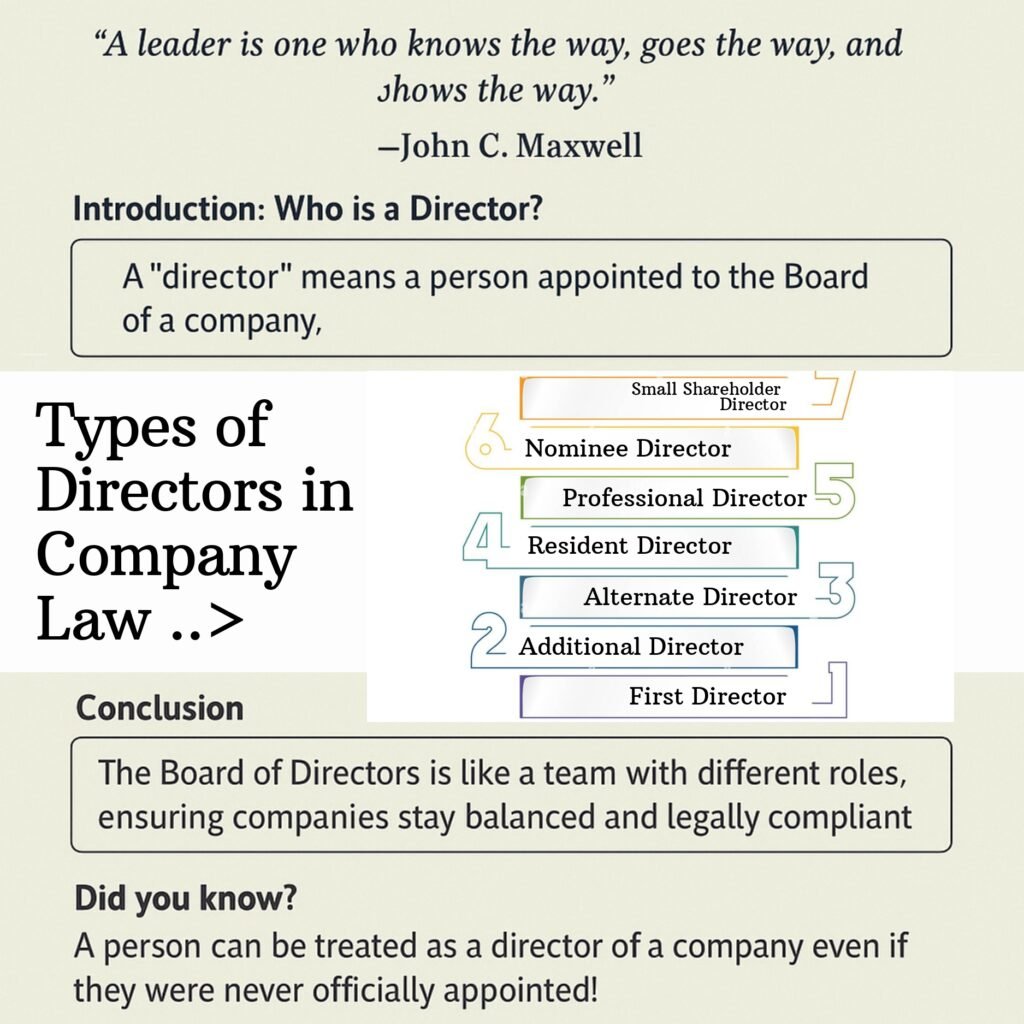“A leader is one who knows the way, goes the way, and shows the way.”
~John C. Maxwell
Leadership is not just about holding a title. It’s about taking responsibility, making decisions, and guiding others toward a goal. This quote perfectly fits into the corporate world, where the Board of Directors plays a key role in steering a company in the right direction.
Just like a Captain who navigates the ship through calm and stormy waters alike, directors are expected to guide companies through both profit and problems. But in the world of company law, not all directors are the same. They come with different names, roles, and responsibilities.
Let’s understand more about these types of directors in Company Law in a simple way.
Introduction: Who is a Director?
In simple words, a director is a person who helps run a company, being the management professionals. Since a company is a legal person and not a real human being, it cannot do anything on its own. It needs people to make decisions, sign papers, and take responsibility. That’s where the Company Directors come in.
Director Definition as per the Companies Act, 2013
- A “director” means a person appointed to the Board of a company (Companies Act, 2013, Section 2(34)).
- The “Board of Directors” refers to the group of such people who collectively manage and take decisions for the company (Companies Act, 2013, Section 2(10)).
The Companies Act also makes it clear that:
- Every company must have a Board of Directors consisting of individuals (Companies Act, 2013, Section 149).
- A director cannot transfer their office to someone else — such assignments are void (Companies Act, 2013, Section 166(6)).
The Board of Directors ensures that everything in the company runs smoothly, ethically, and legally. They call meetings, make decisions, manage finances, and ensure that the goals of the company are being met.
Types of Directors in Company Law
Let us now look at the different types of directors based on their appointment, role, and responsibilities.

We will now explore each one in simple terms.
1. First Director
The first director is the very first person (or group of people) who manages the company after it is created. They are usually promoters of the company. According to Section 152 of Companies Act, if the company’s founding documents (Articles of Association) don’t name anyone as the Director, then the people who signed the company’s registration papers become the first directors.
Role of First Director
- Start managing the company from the very beginning.
- Make initial decisions.
- Conduct first Board meetings.
2. Additional Director
As per Section 161(1) of Companies Act, 2013, the Board of Directors can appoint an Additional Director if they feel extra help is needed. This can happen between two Annual General Meetings (AGMs). But the Additional Director holds office only till the next AGM.
Role of Additional Director
- He/She temporarily joins the Board to support decision-making.
- Steps in when there’s a gap or need for more directors.
3. Alternate Director
If a director is out of India for more than three months, the company can appoint an Alternate Director to temporarily take their place (Section 161(2)).
Role of Alternate Director
- Alternate Directors act as a substitute for an original director.
- Attend meetings and make decisions during the absence.
4. Resident Director
Every company must have at least one director who stays in India for at least 182 days in a financial year, as laid in Section 149(3) of Companies Act. This is to ensure the company has someone in the country to take responsibility.
Role of Resident Director
- The Resident Director acts as the local face of the company.
- Comply with Indian legal requirements.
5. Professional Director
A Professional Director is someone who is an expert in their field, like finance, law, HR, or marketing. Though not specified in Company Law, they are usually involved in subject matter expertise rather than executive decisions. They may not be involved in daily operations, but are brought in for their knowledge and insight.
Role of Professional Director
- Guide the company using their expertise.
- Help in making technical and strategic decisions.
6. Nominee Director
As per Section 161 (3), a director is nominated by another body — usually a bank, financial institution, or group of shareholders. For example, if a bank gives a loan, it might want someone on the Board of Directors to keep watch.
Role of Nominee Director
- Nominee Directors represent the appointing party’s interests.
- Monitor financial discipline and key decisions.
7. Small Shareholder Director
If a company is listed, small investors (minority shareholders) may come together to elect a director to represent them. Section 151 of the Companies Act lays about this concept to give voice to those who own small portions of shares.
Role of SSD
- Raise concerns of minority shareholders.
- Act as a bridge between small investors and the management.
Conclusion
As we can see, the Board of Directors is like a team made up of people with different roles, just like in a movie crew or a cricket team. Each one is there for a reason: some guide, some protect, and some represent others.
Understanding the types of directors in Company Law helps us understand how the corporate entities stay balanced, take decisions, and remain legally compliant. Directors are like the hands and brains of a company. Without them, the company cannot move forward.
Did you know?
A person can be treated as a director of a company even if they were never officially appointed! Under company law, if someone acts like a director or gives directions that the real directors usually follow, they can be considered a “shadow director” or “de facto director” and they can be held legally responsible just like an actual director (Stonegate Legal, 2021). The concept is well-known worldwide and not alien to India as well.
References
- Companies Act, 2013 – Sections 2(34), 2(10), 149, 152, 166(6).
- Institute of Company Secretaries of India (ICSI), Company Law, Executive Programme, Module 1, Paper 1, Page 638.
- John C. Maxwell, The 21 Irrefutable Laws of Leadership.
- Stonegate Legal, what is a Shadow Director or De Facto Director? 2021. https://stonegatelegal.com.au/what-is-a-shadow-director-de-facto-director/
The understanding on various types of Directors is brought in by our intern, Ms. Pari Mirani. She has been assisting the team in bringing informational legal blogs.








